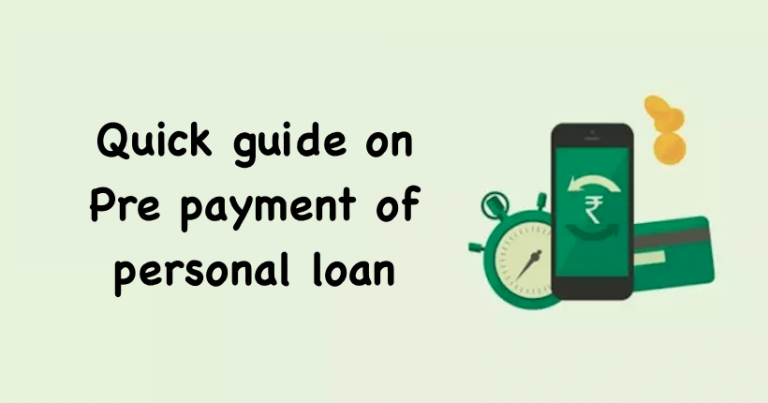Quick guide on Pre payment of personal loan: Personal loans in India are the choice of most of the salaries and working for middle class. Since a personal loan comes does not ask for collateral security, they are the most sought-after solutions to meet urgent financial needs. However, they come with high-interest rates given the fact that they are unsecured in nature. So, the borrower has to discharge the principal interest with these higher interest rates till the loan is completely repaid.
One option available to reduce the burden of interest is pre-paying the personal loan. However, banks charge a certain amount of pre-payment charges. So, it is very important to assess the financial viability of pre-payment before going ahead with it. check out more details for the Prepayment of personal loan from below…
Pre payment of personal loan
What is pre-payment?
Pre-payment is an option available to the borrower to repay his loan entirely or a part of it before the already defined due date. While taking a personal loan, the banker and borrower would agree for a repayment schedule defining the due dates for each installment. Repaying the loan before these installment due dates is pre-payment.
Why pre-payment?
Personal Loans are some of the most expensive loans available in the market. They carry a high interest rate. Sometimes when a borrower is left with additional savings, it is possible for him to pre-pay the loan rather than waiting for each installment. This would save a lot of interest, especially when pre-payment is made to discharge the entire loan.
Costs involved in Pre payment of personal loan:
Most of the banks charge pre-payment charges/foreclosure penalty in case you want to pre-pay off your loan. Though RBI has made in mandatory for the banks not to charge pre-payment penalty charges for foreclosure, it is applicable only on the loans that are sanctioned on floating interest basis. Since most personal loans are fixed rate loans, RBI mandate does not have any bearing on this.
Before taking a decision to pre-pay your personal loan, you must calculate how much you will have to pay as pre-payment fees and how much is the gain you are going to get in terms of savings in interest for paying off the loan in advance. If the net gain is considerably good for you, then go ahead for pre-payment after discussing the same with your lender once.
Full or part pre-payment:
Most of the banks set a lock in period within which one is not allowed to pre-pay the loan. It is this period during which most portion of the total interest is getting paid to the bank as the amount of principal outstanding is high only in this period.
Remember the fact that banks calculate interest on outstanding principal amount. So, the early you pay off your loan, the most is the savings in total interest cost. So, if you have enough finance, consider the pre-payment charges and choose to pre-pay the entire loan as soon as the lock in period ends to save a substantial portion of your interest pay out.
If your finances do not allow you to discharge the entire loan in advance, you can repay the loan partly in advance. This at least would save the some portion of interest as the pre-payment amount is going to get directly deducted from the remaining principal outstanding. But most of the banks put a limit on the maximum number of pre-payments that can be made. So, thing wisely and decide aptly.
Pre-payment charges charged by some popular banks:
| Bank | Charges |
| SBI (Xpress credit personal loan) | Any prepayment of EMIs in full or in part and closure of account before the end of term will attract the prepayment charges of 3% on prepaid amount |
| ICICI Bank | 5% per annum of principal outstanding plus GST |
| Axis bank | Nil |
| HDFC |
|
Effect of pre-payment on credit rating:
Though pre-payment of a part of your loan does not have any direct impact on your credit rating, pre-paying the loan entirely will improve the credit rating once the loan is closed.
Related Articles
